18 Best Foods to Ease Your Cough and Cold
By Dr. Malavika Athavale +2 more

Get,

to manage your symptom
Get your,


4 Cr+ families
benefitted

OTP sent to 9988776655



You’ve successfully subscribed to receive
doctor-approved tips on
Whatsapp

Get ready to feel your best.

Hi There,
Download the PharmEasy App now!!


Register to Avail the Offer
Send OTPBy continuing, you agree with our Privacy Policy and Terms and Conditions

Hi There,
Sign up on PharmEasy now!!
Trusted by 4 crore+ families

OTP sent to 9988776655



You have unlocked 25% off on medicines




Code: NU25

Comments


Leave your comment here
By Dr. Malavika Athavale +2 more
Table of Contents
Winter is coming!
A cosy room, warm blankets, a cup of hot chocolate, and some pleasant music is the perfect way to enjoy this season. But winter can quickly lose its charm if you’re struggling with a cough or cold.
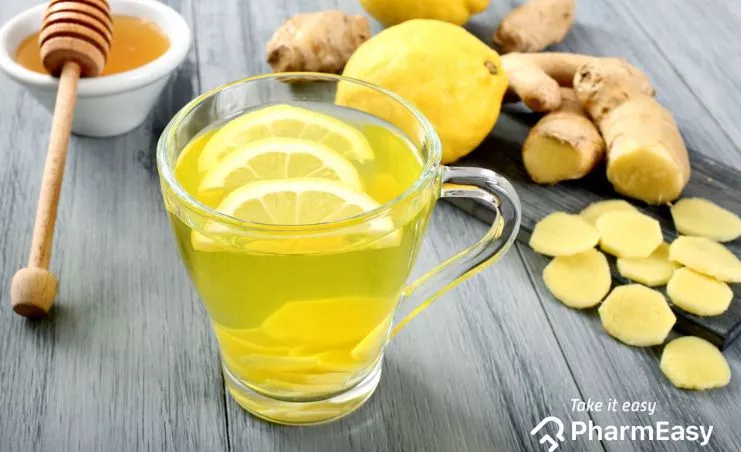
Cough and cold can be frustrating and debilitating, especially when coughing fits are hard to control. It is normal to clear your throat when something feels stuck, but if the irritation is severe, it may develop into a lingering cough. During winter, a weakened immune system can also make you vulnerable to infections.
Coughing is your body’s natural way of clearing your throat and airways of mucus, irritants, and blockages, such as when food accidentally goes down the wrong way. Cough is usually classified as acute or chronic based on how long it lasts12. Acute cough lasts for less than three weeks, and chronic cough lasts for more than eight weeks.
Cough can be ongoing or short-term based on the underlying cause of cough. The causes of cough range from temporary infections to long-term conditions. Some of the most common causes of cough include12:
Coughs can vary depending on their underlying cause, but are commonly classified as:
If you have a wet cough, you don’t want to suppress it as the infected mucus should drain out, but you want to ease your dry cough because it is exhausting. Here, we have listed some common foods, herbs or home remedies that will help you get relief from the dry and wet cough.

Tulsi (Holy Basil) is traditionally used to ease coughs due to its soothing, anti-inflammatory, and antimicrobial properties13. It may help loosen mucus, making it easier to expel, and can calm throat irritation. Tulsi is often consumed as a tea or in herbal remedies to support respiratory health.
In my opinion, Tulsi is the super herb in Ayurveda. When you catch a cough or a cold, guess who might come to the rescue? That’s right, Tulsi! This herb may act like the superhero of the Ayurvedic universe, fighting off germs and boosting your immune system like a champ13.
Dr. Siddharth Gupta, B.A.M.S, M.D (Ayu)
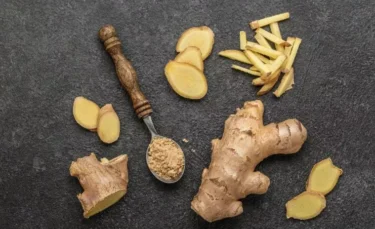
Ginger is a popular home remedy for cough and acts as an anti-inflammatory1. A cup of hot ginger tea can ease your annoying cough and sore throat. Ginger contains certain compounds that dilate the blood vessels of the lungs and relax and smoothen the muscles that lead to the opening of the airways. You can slice up fresh ginger or freshly grated ginger in hot tea for relief from cough.
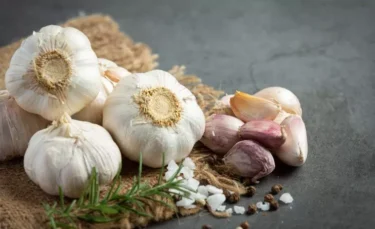
Garlic can help you fight cold and flu2. It ensures faster recovery and has other health benefits as well3. You can have garlic raw or add it to your chicken or vegetable soup, dal, or broth. Garlic is rich in compounds that boost immunity, has medicinal properties, and can be a part of your daily diet.
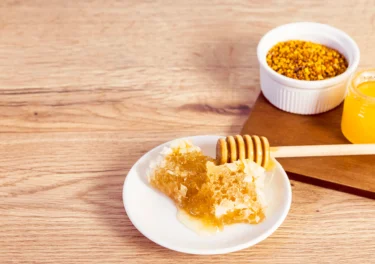
Raw honey is versatile in its healing properties, particularly in respiratory ailments. It possesses antibacterial, antiviral, antifungal, and anti-inflammatory properties that may help reduce the intensity and duration of a cough4. For better results, make tea with two tablespoons of honey and two tablespoons of fresh lemon juice with adequate water. Lemon works as a natural antioxidant and can help revitalise your energy levels. Do check with your doctor if you have diabetes.
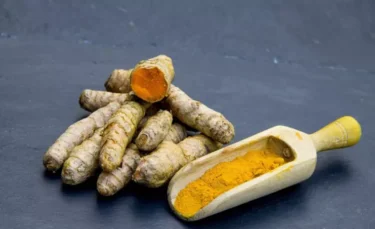
Turmeric milk is a popular home remedy in India, used for a myriad of ailments. It is a potent home remedy that can be helpful for sore throat and cough5. Turmeric is highly beneficial due to its active compound, curcumin, which gives the spice its yellow colour and provides anti-inflammatory properties. Curcumin helps boost the immune system and enhances the body’s antibody response to infections. Add some black pepper to the turmeric to improve the absorption of curcumin.
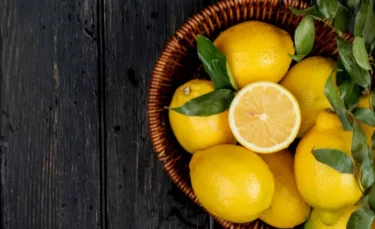
Packed with vitamin C and antioxidants, lemon is great for boosting your immunity. It helps to boost immunity and is also essential for DNA repair and serotonin production. Freshly squeezed lemon juice with warm water or tea can help you soothe your sore throat and cough6. If you have cold, cough or flu, eating oranges may help you recover faster, as they are rich in vitamin C and support the immune system.
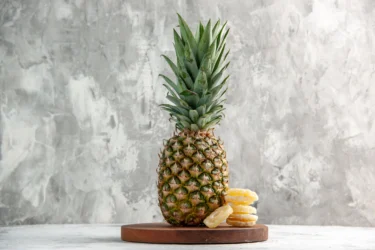
It may come as a surprise, but pineapple can be a powerful natural aid for cough. Bromelain, an enzyme found in pineapple, has anti-inflammatory and mucolytic (breakdown of mucus) properties8. These two characteristics of bromelain make pineapple an excellent food to help relieve your cough.
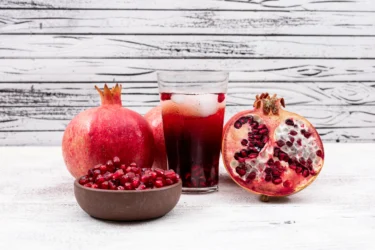
Fresh pomegranate juice is rich in antibacterial and anti-inflammatory compounds. It contains flavonoid antioxidants that may help fight viruses and potentially shorten the length of a cold by up to 40%7. You can drink fresh pomegranate juice daily or add it in smoothies or herbal tea.
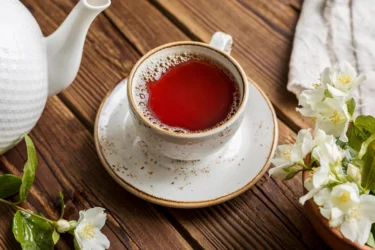
Hot tea (green, black, and regular) is one of the best remedies during a cough or cold. Rich in antioxidants, tea can help soothe your sore throat and loosen mucus, thus helping clear your nasal congestion. Chamomile tea is another helpful option, as it has antibacterial and anti-inflammatory properties. It also promotes better sleep and supports your immune system.
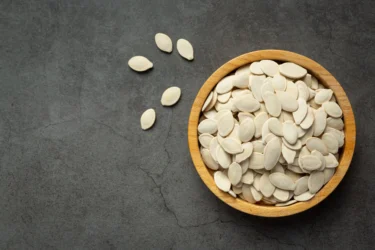
Pumpkin seeds are rich in zinc, a mineral that your body requires to support the function of white blood cells, which play a key role in fighting off pathogens like the flu virus. You can enjoy them as a snack or add them as a topping to your salad for that extra flavour and crunch.
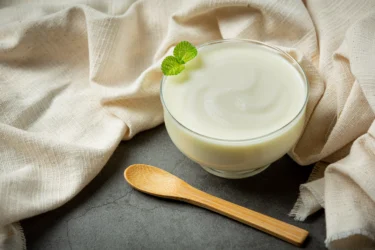
Probiotics may help support your body’s natural defences against cold and flu11. People who regularly consume probiotics like yoghurt are overall healthier and may recover faster than those who don’t get enough probiotics. They even experience less severe flu symptoms.
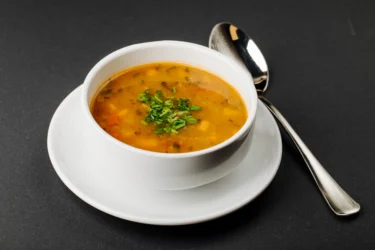
Yes, your granny was right! Chicken soup or broth or Rasam (if you are a vegetarian) are excellent foods to eat when you have the flu. The steam and the herbs from soup or broth speed up the movement of mucus through the nose to relieve congestion. A healthy soup also helps reduce inflammation. Sipping hot soup can support your immune system, which plays a key role in defending the body against bacteria and viruses. If you don’t eat chicken, you can have vegetable soups flavoured with ginger, garlic, turmeric, and black pepper.

Vegetables are rich in antioxidants that help strengthen your immune system. Fresh vegetable juice can help speed up your recovery from illnesses like the flu. When you are down with flu, and your sense of taste is affected and you do not feel like eating solid foods, a glass of vegetable juice can be the perfect nourishing option for you. You can add vegetables like carrots and kale, known for their antiviral properties, to your juice. For maximum benefit, always prepare fresh juice.

Cough and cold take a toll on your immune system and make you weak. Even if you lose your appetite while sick, the right nutrition can help you spring back to normal health sooner. A turkey sandwich will provide you with the essential protein building blocks that your immune system needs to fight the flu. In India, Turkey could be replaced with any lean meat like chicken and vegetables.

Chicken stew is a comfort food that you can rely on when you have a sore throat, a bad cough or flu. The combination of ingredients that go into chicken stew (vegetables, chicken broth, salt, pepper, onion and garlic) can soothe your symptoms and support early recovery.
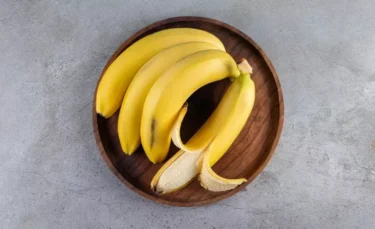
Bananas are nutrient-rich, easy-to-digest fruits that contain fast-acting carbohydrates and soluble fibre. When you have cough, cold or other problems like nausea or vomiting, bananas help in early recovery. Bananas are a part of the BRAT (Banana, Rice, Applesauce and Toast) diet, which is recommended for people with cough, cold and stomach ailments.
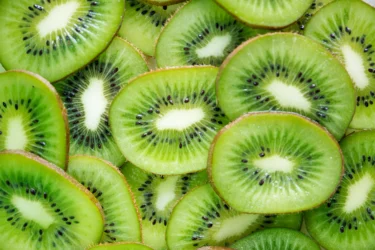
Kiwi may sound like an unusual remedy, but is one of the best foods to ease your cough9. Adults who eat kiwi when they have cold and flu symptoms may show quicker recovery in their sore throat. The micronutrients in kiwi enhance the concentration of red blood cells, which may give you a quick immunity boost.
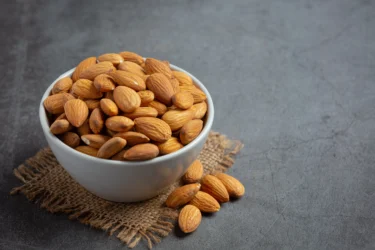
Almonds may benefit when it comes to cold and cough. Almonds skin contains polyphenols, a compound that helps to increase the disease-fighting activity of white blood cells against viruses10. Even after the almonds have been digested, this immunity boost lingers for quite some time. However, the same benefit is not seen if almonds are eaten without the skin.
| Tips | How it helps |
| Clean your nose | Blowing your nose gently (with a clean cloth) as well as using a saltwater rinse can effectively remove the phlegm building up in your nasal passages. |
| Gargle | Gargling with warm water can help clear your throat, reduce mucus as well as ease throat discomfort. Drinking warm beverages can also ease your throat pain. |
| Diet | Following the dietary recommendations given above can boost your overall health and support your immune system. |
| Steam | Steam inhalation or even simply taking a steamy shower can open up your blocked nasal passages, ease your breathing, and help you relax. |
Although your cough or cold may feel overwhelming, a healthy diet can make a big difference by boosting your immunity and keeping you healthy.
Based on my observation, neem leaf might be a natural superhero for cold and fever! It might help boost your immune system, fight inflammation, and may have antibacterial and antiviral powers. Brew some neem leaf tea or try a neem leaf supplement and ensure good health14.
Dr. Smita Barode, B.A.M.S, M.S.
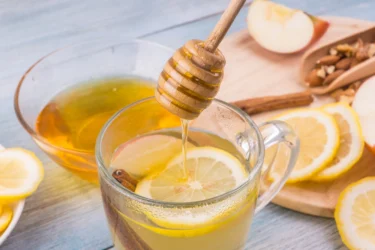
A warm drink made with honey and lemon can help soothe a sore throat and ease cough symptoms naturally. Honey coats the throat, eases irritation and reduces coughing. Lemon, which is rich in vitamin C, supports your immune system and helps fight cold symptoms.
Ingredients:
Instructions:
Mix the honey and lemon juice in warm water until well combined. Sip this soothing drink to help relieve cough and soothe the throat.
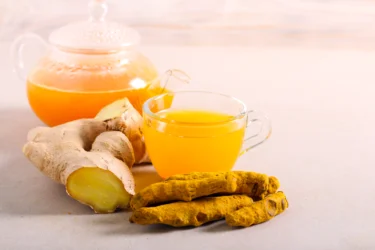
This tea combines two powerful immune-boosting ingredients, ginger and turmeric. Ginger, with its anti-inflammatory properties, can help soothe the throat and reduce coughing. Turmeric contains curcumin, a compound known for its immune-supportive and anti-inflammatory effects, which can aid in managing cold symptoms.
Ingredients:
Instructions:
Boil water in a saucepan and add grated ginger and turmeric powder. Simmer for 5 minutes. Strain the tea into a cup. Add honey if desired and stir well. Enjoy this immune-boosting tea to ease cough and cold symptoms. But always remember to not overdo this drink, as it may be too heat-inducing for some individuals.
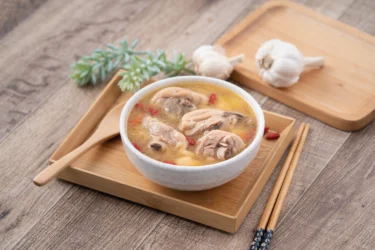
Garlic is well-known for its antibacterial and antiviral properties, which can help fight off infections that cause cough and cold. Garlic chicken soup combines the immune-boosting properties of both garlic and chicken soup, offering hydration, warmth, and nourishment from the vegetables and chicken, while providing comfort and supporting immune function during illness.
Ingredients:
Instructions:
Warm some olive oil in a pan over medium heat, then sauté minced garlic, chopped onions, carrots, and celery. Sauté until vegetables are tender. Add chicken broth and bring to a boil. Reduce heat and simmer for 15-20 minutes. Add cooked chicken and season with salt and pepper. Cook for an additional 5 minutes. Enjoy this comforting and nourishing soup for its soothing effects on cough and cold symptoms.
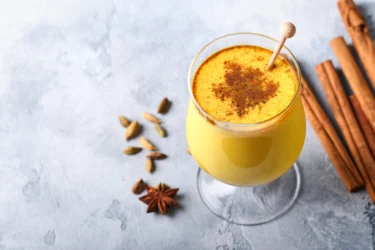
Golden milk combines the benefits of turmeric with warm milk. Curcumin, the main compound in turmeric, has inflammation-reducing properties that may ease irritated airways and suppress cough. Warm milk provides comfort and hydration, helping to alleviate cold symptoms.
Ingredients:
Instructions:
Heat milk in a saucepan over medium heat. Add turmeric, cinnamon and ginger powder. Whisk well to combine. Heat until warm but not boiling. Add honey if desired and stir until dissolved. Golden milk is known for its anti-inflammatory properties and can help relieve cough and cold symptoms.
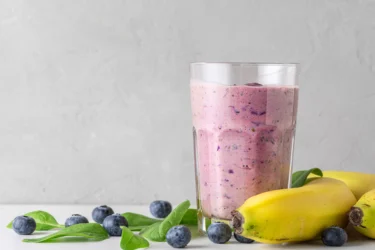
This vitamin-rich smoothie combines the goodness of ripe banana and mixed berries. . Bananas are rich in vitamin C, B6, and potassium, which help support a healthy immune system. Berries, such as strawberries and blueberries, are antioxidant-rich fruits with high vitamin C content that may ease coughing and strengthen your immune system.
Ingredients:
Instructions:
Blend all the ingredients together until smooth. You can add a few ice cubes if you’d like it chilled. This nutrient-rich smoothie supports your immune health during colds and cough.
Also Read: What is Influenza (Flu) & Its Types
Incorporating the right foods into your diet can significantly help alleviate the symptoms of cough and cold. Nutrient-rich options like honey, lemon, garlic, and ginger support immune function, soothe the throat, and reduce inflammation. Along with proper rest and hydration, these foods can help speed up your recovery. Maintaining a healthy diet during illness can ensure a quicker return to better health and comfort.
Also Read: Food for Dengue – What To Eat And What To Avoid!
No. Coughs associated with the common cold and flu are usually not contagious. However, whooping cough (pertussis) is a contagious bacterial infection that spreads through sneezing or coughing. An infected person can be contagious for about two weeks, although modern medicine and antibiotics can help reduce this period significantly.
When experiencing a cough and cold, following these personal hygiene tips will help you recover faster and reduce the risk of spreading the infection to your loved ones:
-Always cover your nose and mouth with a tissue or handkerchief when coughing or sneezing. Using a tissue is always preferable as it is easily disposable.
-Dispose of used tissues in the trash can.
-Before handling food or any surfaces in the house, wash your hands with soap and water.
The use of masks in public spaces or any social gatherings is also recommended to control the spread of infection.
Certain foods can worsen your symptoms during a cough and cold. It’s best to avoid the following foods:
Sugar: Whether in your tea, coffee, chocolates, sweets, or pastries, sugar should be avoided as it can suppress the immune system, making it harder for your body to fight off infections.
Alcohol: While some might recommend a bit of gin and tonic for relief, alcohol actually weakens the white blood cells and increases inflammation in the bronchial and lung tissues. It can also dehydrate you, which is the opposite of what you need when you’re sick.
Caffeinated Drinks: Beverages like tea, coffee, or other caffeinated drinks act as diuretics, causing your body to lose water and salts. This can lead to dehydration, making you feel worse.
Spicy food: Although spicy foods may temporarily thin out the mucus, they contain capsaicin, which can actually increase phlegm production in the long run, potentially delaying recovery.
Milk: Drinking milk can thicken the mucus and increase phlegm production, making your symptoms worse. However, a small cup of hot turmeric (haldi) milk may help some individuals due to the anti-inflammatory properties of turmeric.
Cold temperatures alone don’t cause the common cold. However, they may contribute to the spread of respiratory viruses as people tend to spend more time indoors in close proximity to each other during colder months.
Most colds can be managed at home, but you should seek medical attention if you experience severe symptoms, such as high fever, persistent or worsening cough, difficulty breathing, chest pain, or if your cold symptoms last longer than expected.
A persistent cough after a cold is commonly caused by postnasal drip, which occurs when excess mucus from the nose and sinuses drips down the throat. This can irritate the throat and lead to a lingering cough.
The duration of a common cold can vary, but most symptoms typically last for about 7 to 10 days. However, some symptoms, like cough, may persist for a few weeks.
No, antibiotics are not effective against viral infections like the common cold. Colds are triggered by viruses, and since antibiotics target bacteria, they aren’t effective for viral infections. Misusing antibiotics may also lead to resistance. Taking antibiotics unnecessarily can contribute to antibiotic resistance and should be avoided.
Disclaimer: The information provided here is for educational/awareness purposes only and is not intended to be a substitute for medical treatment by a healthcare professional and should not be relied upon to diagnose or treat any medical condition. The reader should consult a registered medical practitioner to determine the appropriateness of the information and before consuming any medication. PharmEasy does not provide any guarantee or warranty (express or implied) regarding the accuracy, adequacy, completeness, legality, reliability or usefulness of the information; and disclaims any liability arising thereof.
Comments

Leave your comment...

View all comments(9)
You may also like
The information was very helpful. Thank you so much
You are most welcome. Hope you found it useful.
Thank you for your article, I find it beneficial in terms of eating natural foods as a cure to an illness instead of synthetic drugs that has many negative side effects.
Thanks for your feedback. Stay tuned for more such articles.
This article is very helpful. thanks for sharing such important knowledge.
The information is very useful. Thanks.
Thanks for the information. This is quite useful.
this information was beneficial I loved it so much
Thank you for the information.